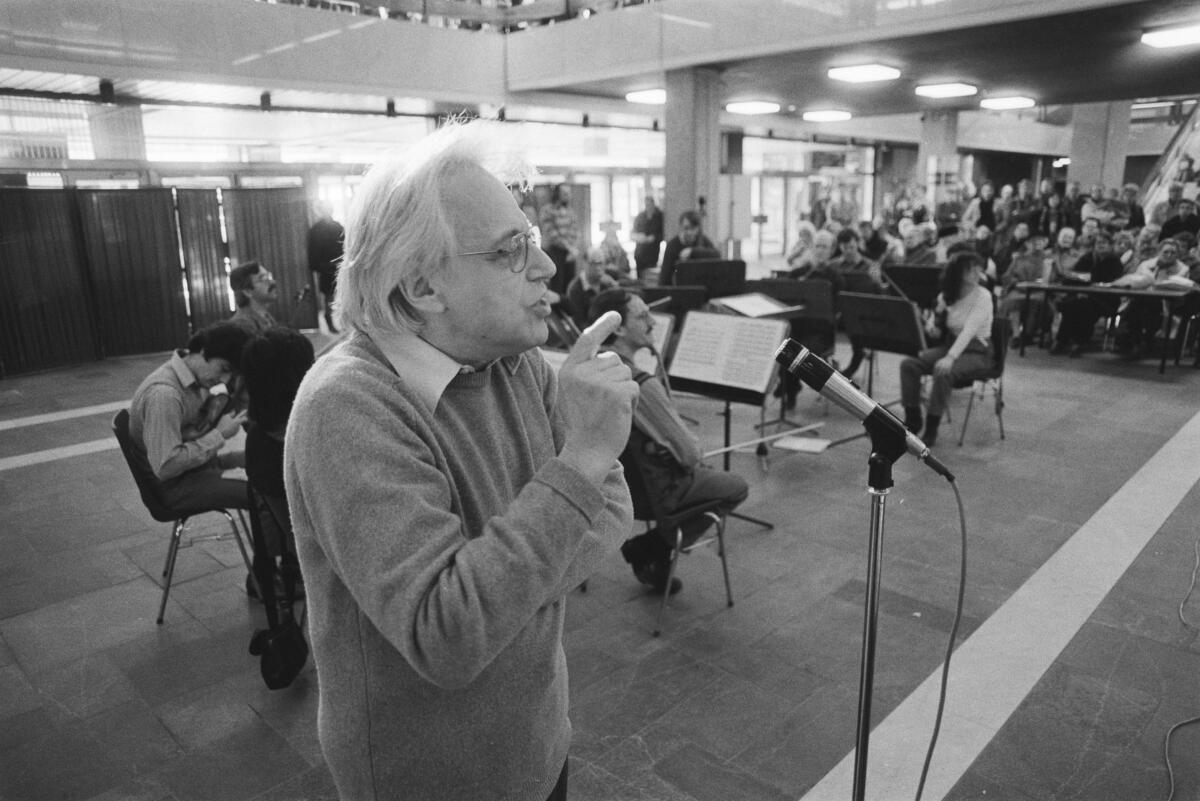NYKY Ensemble: Ligeti

NYKY Ensemble starts its autumn season with a major Ligeti retrospective concert, which focuses on piano chamber music. Professor Joonas Ahonen, a Ligeti expert and professor for piano at Hochschule für Musik und Tanz Cologne, has directed NYKY Ensemble before the concert.
Programme
Musica Ricercata (8′)
I. Sostenuto – Misurato – Prestissimo
III. Allegro con spirito
VI. Allegro molto capriccioso
VIII. Vivace. Energico
Trio for Violin, Horn and Piano (25′)
I. Andantino con tenerezza
II. Vivacissimo molto ritmico
III. Alla marcia
IV. Lamento. Adagio
Der Sommer (3′)
Intermission (10 minutes)
String Quartet No. 1 (Métamorphoses nocturnes) (20′)
3 Pieces for Two pianos (20′)
I. Monument
II. Self-portrait with Reich and Riley (with Chopin in the background)
III. In a gentle flowing movement
Performers
NYKY Ensemble:
Anastasia Despotis, Horn
Vilma Peltonen, Horn
Kiryl Bartashevich, Piano
Máté Dömöter, Piano
Samuel Eriksson, Piano
Liisa Smolander, Piano
Maja Burggraaf, Soprano
Juliana Pöyry, Violin
Venla Saavalainen, Violin
Aimar Tobalina, Violin
Grettel Eerik, Viola
Auroora Perttunen, Cello
Joonas Ahonen, Coaching
Sirje Ruohtula, Lighting technician
Libero Mureddu, Intendent of the NYKY Ensemble
Jaakko Kilpeläinen, Producer of the NYKY Ensemble
György Ligeti
György Ligeti (1923–2006) was a Hungarian-Austrian composer of Jewish descent, born on May 28, 1923, in Dicsőszentmárton (nowadays Târnǎveni) in Romania. He studied composition in Cluj and Budapest, under teachers like Ferenc Farkas and Sándor Veress, before fleeing Hungary in 1956 due to political unrest. Settling in Western Europe Ligeti became associated with avant-garde music, working at the West German Radio’s electronic music studio in Cologne from 1957-58. There, he encountered composers such as Karlheinz Stockhausen and Pierre Boulez.
Ligeti gained international recognition with his orchestral works Apparitions (1958-59) and Atmosphères (1961), the latter featuring prominently in Stanley Kubrick’s film 2001: A Space Odyssey. His music often employed “micropolyphony,” a technique involving densely woven textures of overlapping voices. Ligeti’s work evolved through his opera Le Grand Macabre (1974-77, revised 1996), as well as complex polyrhythmic techniques seen in his Piano Études (1985–2001), Piano Concerto (1985–88), and Violin Concerto (1990–92).
Ligeti held teaching positions at institutions including the Royal Swedish Academy and the Hochschule für Musik in Hamburg, where he taught from 1973 to 1989. Throughout his life, he received numerous prestigious awards, including the Polar Music Prize (2004), the Ernst von Siemens Music Prize (1993), and the Kyoto Prize (2001). He passed away in Vienna on June 12, 2006.
NYKY Ensemble
NYKY Ensemble is a contemporary music group of Uniarts Helsinki’s Sibelius Academy, which serves as a forum for contemporary music projects and provides perspectives on the trends and techniques of our time, such as expanded playing techniques, live electronics, microtonality, minimalism or cross-disciplinary artistic cooperation. The composition of the ensemble depends on the pieces to be presented at any given time, and the visiting supervisor in each concert period is a musician or ensemble specialising in contemporary music.
NYKY Ensemble starts its autumn season with a major Ligeti retrospective concert, which focuses on piano chamber music. Professor Joonas Ahonen, a Ligeti expert and professor for piano at Hochschule für Musik und Tanz Cologne, has directed NYKY Ensemble before the concert.
Programme
Musica Ricercata (8′)
I. Sostenuto – Misurato – Prestissimo
III. Allegro con spirito
VI. Allegro molto capriccioso
VIII. Vivace. Energico
Trio for Violin, Horn and Piano (25′)
I. Andantino con tenerezza
II. Vivacissimo molto ritmico
III. Alla marcia
IV. Lamento. Adagio
Der Sommer (3′)
Intermission (10 minutes)
String Quartet No. 1 (Métamorphoses nocturnes) (20′)
3 Pieces for Two pianos (20′)
I. Monument
II. Self-portrait with Reich and Riley (with Chopin in the background)
III. In a gentle flowing movement
Performers
NYKY Ensemble:
Anastasia Despotis, Horn
Vilma Peltonen, Horn
Kiryl Bartashevich, Piano
Máté Dömöter, Piano
Samuel Eriksson, Piano
Liisa Smolander, Piano
Maja Burggraaf, Soprano
Juliana Pöyry, Violin
Venla Saavalainen, Violin
Aimar Tobalina, Violin
Grettel Eerik, Viola
Auroora Perttunen, Cello
Joonas Ahonen, Coaching
Sirje Ruohtula, Lighting technician
Libero Mureddu, Intendent of the NYKY Ensemble
Jaakko Kilpeläinen, Producer of the NYKY Ensemble
György Ligeti
György Ligeti (1923–2006) was a Hungarian-Austrian composer of Jewish descent, born on May 28, 1923, in Dicsőszentmárton (nowadays Târnǎveni) in Romania. He studied composition in Cluj and Budapest, under teachers like Ferenc Farkas and Sándor Veress, before fleeing Hungary in 1956 due to political unrest. Settling in Western Europe Ligeti became associated with avant-garde music, working at the West German Radio’s electronic music studio in Cologne from 1957-58. There, he encountered composers such as Karlheinz Stockhausen and Pierre Boulez.
Ligeti gained international recognition with his orchestral works Apparitions (1958-59) and Atmosphères (1961), the latter featuring prominently in Stanley Kubrick’s film 2001: A Space Odyssey. His music often employed “micropolyphony,” a technique involving densely woven textures of overlapping voices. Ligeti’s work evolved through his opera Le Grand Macabre (1974-77, revised 1996), as well as complex polyrhythmic techniques seen in his Piano Études (1985–2001), Piano Concerto (1985–88), and Violin Concerto (1990–92).
Ligeti held teaching positions at institutions including the Royal Swedish Academy and the Hochschule für Musik in Hamburg, where he taught from 1973 to 1989. Throughout his life, he received numerous prestigious awards, including the Polar Music Prize (2004), the Ernst von Siemens Music Prize (1993), and the Kyoto Prize (2001). He passed away in Vienna on June 12, 2006.
NYKY Ensemble
NYKY Ensemble is a contemporary music group of Uniarts Helsinki’s Sibelius Academy, which serves as a forum for contemporary music projects and provides perspectives on the trends and techniques of our time, such as expanded playing techniques, live electronics, microtonality, minimalism or cross-disciplinary artistic cooperation. The composition of the ensemble depends on the pieces to be presented at any given time, and the visiting supervisor in each concert period is a musician or ensemble specialising in contemporary music.